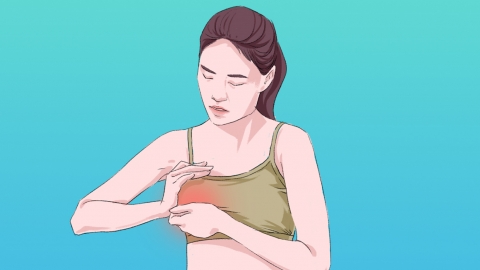What medication can be taken to resolve breast fibroadenoma?
Under normal circumstances, breast fibroadenomas may be caused by factors such as pubertal development, unhealthy lifestyle habits, mastopathy (breast hyperplasia), mastitis, and hyperprolactinemia. It is recommended to seek timely medical advice and, under a physician's guidance, use medications such as Xiaoyao Pills, Rupixiao Tablets, Potassium Penicillin V Tablets, Cefradine Capsules, and Vitamin B6 Tablets for dispersing nodules. Detailed explanations are as follows:

1. Pubertal Development
During puberty, significant hormonal changes occur in females, and breast tissue becomes more sensitive to hormones. At this stage, hormonal stimulation may cause uncoordinated proliferation of glandular epithelial cells and fibrous cells in the breast, potentially leading to breast fibroadenomas. This condition commonly occurs as a physiological change in adolescent females and generally does not require drug treatment. A balanced diet with adequate nutrition is recommended, while foods and supplements containing high levels of hormones should be avoided to prevent further hormonal fluctuations.
2. Unhealthy Lifestyle Habits
Long-term high-fat, high-energy diets, as well as alcohol consumption and smoking, may stimulate breast tissue and increase the risk of developing breast fibroadenomas. Typically, no drug treatment is necessary. It is recommended to adjust dietary patterns, increase intake of fiber-rich foods such as whole grains, vegetables, and fruits, and reduce consumption of high-fat and high-sugar foods.
3. Mastopathy (Breast Hyperplasia)
Mastopathy occurs due to increased sensitivity of breast tissue to estrogen, resulting in excessive proliferation and incomplete regression of breast tissue. Long-standing mastopathy may stimulate the proliferation of breast fibrous tissue, eventually leading to breast fibroadenomas. Symptoms such as breast distension and stabbing pain may also be present. Treatment may include medications such as Xiaoyao Pills, Rupixiao Tablets, and Xiaojin Pills, under a physician's guidance.
4. Mastitis
Mastitis is usually caused by bacterial infection, commonly seen in lactating women due to milk stasis and nipple damage that allows bacterial invasion. It may lead to inflammatory proliferation of breast tissue, and long-term chronic inflammation may trigger breast fibroadenomas. Symptoms such as breast redness, swelling, and pain may also be present. Treatment typically involves medications such as Potassium Penicillin V Tablets, Cefradine Capsules, and Amoxicillin Capsules, following medical advice.
5. Hyperprolactinemia
Hyperprolactinemia is caused by excessive secretion of prolactin from the anterior pituitary gland, resulting in elevated blood prolactin levels. Excess prolactin may stimulate breast tissue proliferation, leading to breast fibroadenomas. Symptoms such as menstrual irregularities and infertility may also occur. Treatment may involve medications such as Octreotide Acetate Injection, Vitamin B6 Tablets, and Aripiprazole Tablets, as advised by a physician.
Maintaining healthy lifestyle habits, regular sleep patterns, balanced nutrition, appropriate exercise, and reduced intake of high-fat, high-calorie foods are recommended. Additionally, regular breast examinations should be conducted to detect and address abnormalities promptly.






